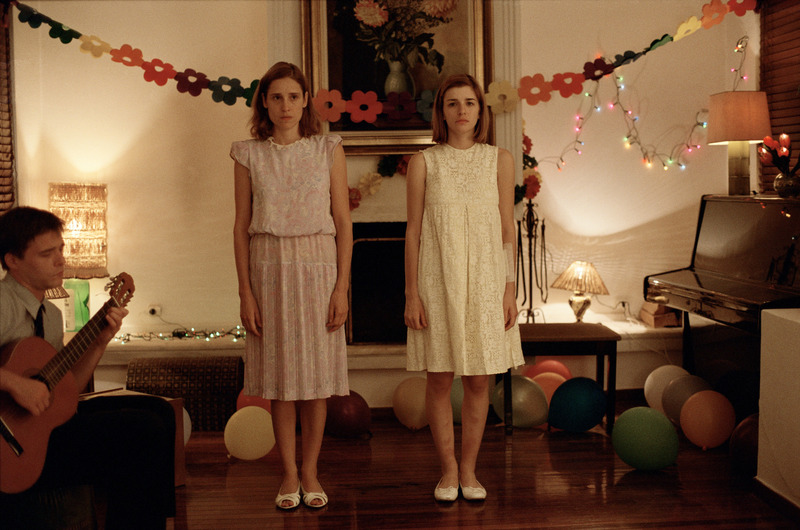
Control, Obedience, and the Cost of Isolation
MOVIE REVIEW
Dogtooth (Kynodontas) (4K UHD)
–
Genre: Drama, Cult
Year Released: 2009, Kino Lorber 4K 2025
Runtime: 1h 37m
Director(s): Yorgos Lanthimos
Writer(s): Yorgos Lanthimos, Efthymis Filippou
Cast: Christos Stergioglou, Michele Valley, Angeliki Papoulia, Christos Passalis, Mary Tsoni, Anna Kalaitzidou
Where to Watch: available now, order your copy here: www.kinolorber.com or www.amazon.com
RAVING REVIEW: DOGTOOTH remains one of the most startling debuts in modern cinema, the film that first presented Yorgos Lanthimos as a director unafraid of discomfort, ambiguity, and provocation. Now restored and released in 4K by Kino Lorber with director-supervised grading and remastered audio, it arrives with sharper edges than ever. Though released in 2009, its disturbing questions about control and manufactured truth still feel contemporary.
The premise is simple: a mother and father keep their three nearly adult children trapped within their suburban compound, convinced that the outside world is too corrupt and dangerous to endure. Language itself is warped—words are redefined to strip them of meaning—while invented rules, punishments, and rituals enforce obedience. Lanthimos never spells out a single explanation, instead letting viewers sit in the unease of a family dynamic that veers between absurd temperament and quiet horror.
The performances are deliberately affectless, which only adds to the tension. Christos Stergioglou and Michele Valley embody parents whose authority is terrifying in its calmness. Angeliki Papoulia, Christos Passalis, and Mary Tsoni portray children whose speech patterns and stiff gestures underline how their humanity has been shaped—or perhaps erased—by confinement. These performances could feel stilted in another context, but within Lanthimos’s controlled framework, the unnatural delivery becomes the very point.
As a work of direction, DOGTOOTH thrives on precision. Every frame seems carefully measured, the camera often locked in place, as if complicit in the family’s rigidity. Violence erupts not as spectacle but as sudden, almost mundane incidents—shocking in their bluntness because they are delivered without warning or emphasis. This restraint forces viewers to confront their own reactions rather than rely on cues from the filmmaker.
Thematically, the film functions as satire and allegory. On one level, it critiques authoritarianism, asking how language and enforced ignorance can be wielded as weapons of control. On another level, it reflects on the family itself—how protection can slide into suffocation, how innocence cannot be preserved indefinitely, and how rebellion becomes inevitable, no matter how elaborate the cage. The invented rules may sound absurd, yet they expose the fragility of systems we accept as “normal” simply because authority tells us so. There is something about the stillness, the directness, and the moments that hit the hardest, which make the film feel real instead of a staged production.
The restoration brings DOGTOOTH back into focus with a vividness that highlights its unsettling textures. The muted palette now carries more nuance, while the silence of its spaces feels even heavier with remastered sound. Kino Lorber’s edition also includes interviews and commentary, providing context for a film that thrives on raising questions rather than answering them.
Still, DOGTOOTH is not without its challenges. Its pacing is methodical, even alienating, and its refusal to resolve conventionally can frustrate viewers who expect a cathartic conclusion. Some will find its exploration of taboo subjects (including incestuous undertones and unsettling violence) unbearable rather than illuminating. Yet the very discomfort it provokes is part of its power. The film dares to linger in ambiguity, leaving viewers to wrestle with interpretations long after the credits roll. These moments are what make the film stronger than it could have been in someone else's hands.
Fifteen years on, DOGTOOTH retains its bite. It is both dark and devastating, enigmatic yet clear in its message that control—whether within a household or a society—can only ever breed collapse. Lanthimos would go on to direct acclaimed works like THE FAVOURITE and POOR THINGS, but DOGTOOTH remains the raw, uncompromising statement that propelled him into the global conversation.
The film deserves all the recognition for its brilliance and originality, balanced against the intentionally alienating nature of the film. It is not a comfortable watch, nor is it designed to be, but its influence and audacity are undeniable. If anything, the new restoration solidifies DOGTOOTH as a vital, unsettling milestone in world cinema—an art film that shocks, provokes, and refuses to fade.
Please visit https://linktr.ee/overlyhonestr for more reviews.
You can follow me on Letterboxd, Instagram, Twitter, and YouTube. My social media accounts can also be found on most platforms by searching for 'Overly Honest Reviews'.
I’m always happy to hear from my readers; please don't hesitate to say hello or send me any questions about movies.
[photo courtesy of KINO LORBER]
DISCLAIMER:
At Overly Honest Movie Reviews, we value honesty and transparency. Occasionally, we receive complimentary items for review, including DVDs, Blu-rays, CDs, Vinyl Records, Books, and more. We assure you that these arrangements do not influence our reviews, as we are committed to providing unbiased and sincere evaluations. We aim to help you make informed entertainment choices regardless of our relationship with distributors or producers.
Amazon Affiliate Links:
Additionally, this site contains Amazon affiliate links. If you purchase through these links, we may receive a commission. This affiliate arrangement does not affect our commitment to honest reviews and helps support our site. We appreciate your trust and support in navigating these links.



Average Rating